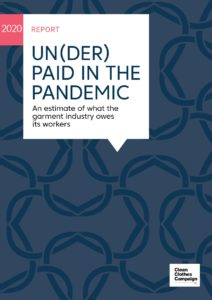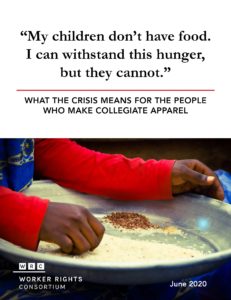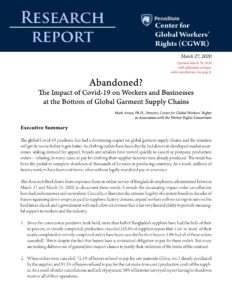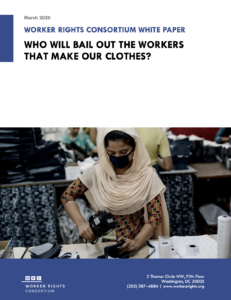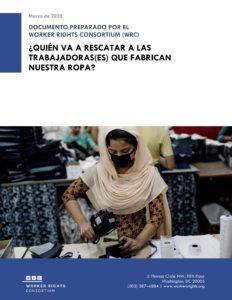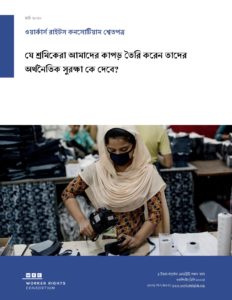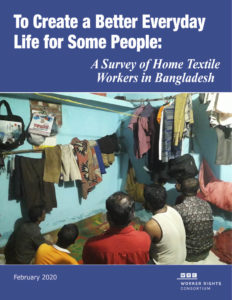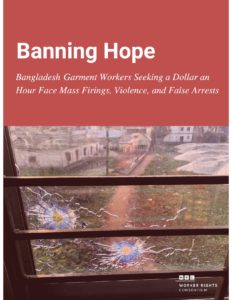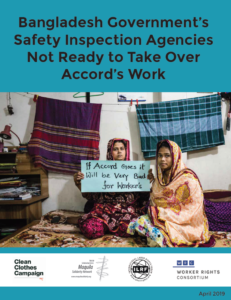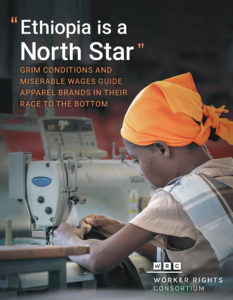Un(der)paid in the pandemic
The report “Un(der)paid in the pandemic” analyzes nonpayment of wages to garment workers during the months of March, April, and May resulting from order cancellations by apparel brands, unpaid leave, and state-sanctioned wage cuts during the Covid-19 crisis. Based on a review of news reports and information from worker organizations, we estimate that across South…
Read MoreThe pandemic represents an unprecedented economic calamity for workers who make university logo products. Across the globe, factories have suspended or dismissed workers in the hundreds and thousands, often with little or no compensation. This includes many factories making collegiate goods. This report includes portraits of six workers at collegiate factories, drawing on workers’ own words to illuminate the impact on their families. Most of these workers are no longer able to buy sufficient food for their children.
Read MoreThis report, authored by Pennsylvania State University’s Center for Global Workers’ Rights, in collaboration with the WRC describes the results of a survey of more than 300 garment suppliers in Bangladesh and has just reported the results. The survey found that 80 percent of apparel suppliers have been forced to slash employment as a result of buyers canceling orders—with nearly 60 percent reporting they have shut down most or all of their operations. Meanwhile, four out of five fired workers have not received the severance pay mandated by law. The survey found that almost none of the buyers had offered suppliers any financial support to help pay workers.
Read MoreCo-authored by WRC executive director Scott Nova and the CCC’s Ineke Zeldenrust, this white paper explains how brands and retailers are shoring up their own finances by refusing to honor contracts with apparel suppliers, forcing suppliers to the brink of bankruptcy and causing large-scale dismissals of workers. The report calls for brands to pay suppliers what they owe them, for the swift mobilization of international financial resources to provide income support to garment workers, and for deeper reforms to address the supply chain inequities that Covid-19 is laying bare.
Read MoreDisponible además en español aquí
Read MoreThere are few research studies on the labor conditions of home textile factory workers. This report aims to fill this gap and to test the supply chain labor standards of the brands that are driving the growth of Bangladesh’s home textile industry against the actual conditions of workers in the factories that produce these goods. Workers interviewed for this report revealed violations of Bangladeshi labor law and brands’ codes of conduct related to building safety, payment of wages, working hours, freedom of association, and abuse.
Read MoreThe government and apparel factory owners in Bangladesh have carried out a brutal crackdown on garment workers in retaliation for largely peaceful protests against the country’s extremely low minimum wage. Since December of 2018, at least 65 workers have been arrested and subjected to baseless criminal charges, brought at the behest of factories that supply brands like H&M, Mango, and Next.
Read MoreThe government of Bangladesh is using proceedings before the Supreme Court of Bangladesh to prevent the Accord on Fire and Building Safety from operating, thereby putting workers’ safety at risk. A ruling on 7 April 2019 in Bangladesh’s Appellate Court could require the Accord to close its Dhaka office and operations without taking into account whether national agencies would be ready to take up the work. The government’s justification for trying to end the Accord’s work depends entirely on its claim that the government is ready to assume responsibility for the 1,688 factories under the Accord’s purview, but our research shows a shocking level of unreadiness.
Read MoreAs global brands continue their relentless quest for low-cost production locations, Ethiopia is emerging as a coveted destination. This report presents the results of an investigation of the labor rights environment in Ethiopia’s growing textile and apparel export sector. The investigation included in-depth interviews with garment workers at four export factories producing for leading brands. It reveals wages that are lower, by a substantial margin, than those in any other significant exporting country and grim working conditions that bear little resemblance to the standards the brands claim to be upholding in their supply chains.
Read More
